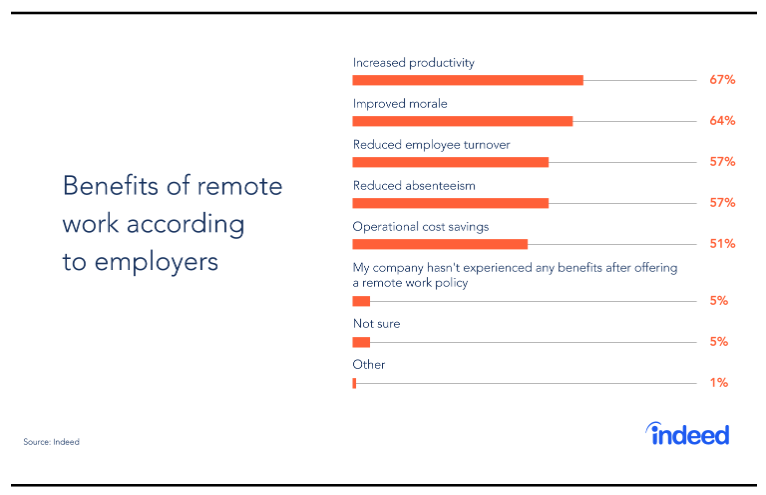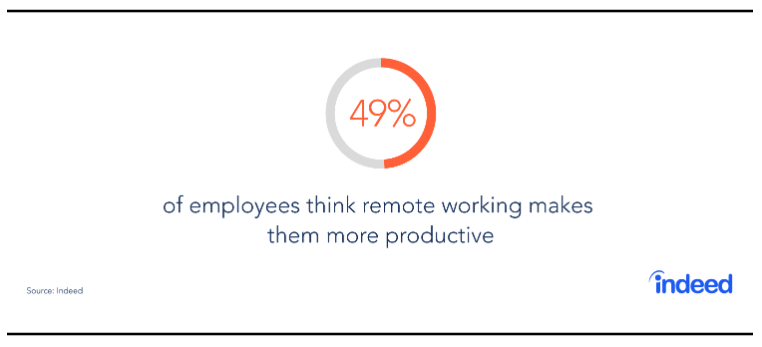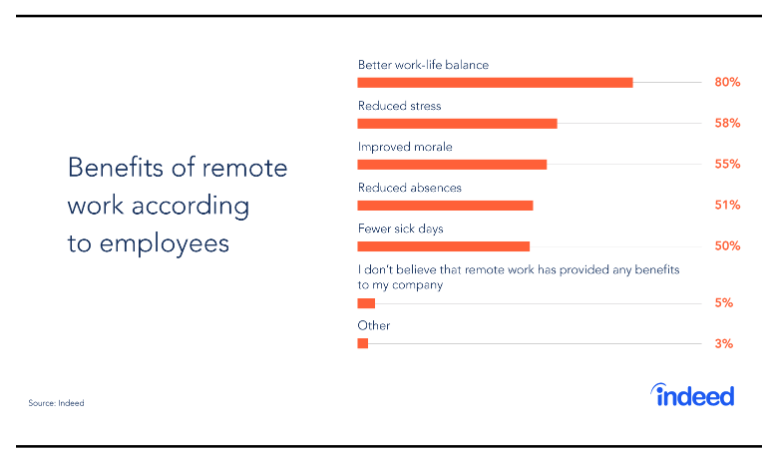REPORT: 68% of Australian Employers Allow Remote Work, But Attitudes Are Divided
Original Post Indeed.com.au 29 January 2019
I was invited on Sky News Business to discuss the challenges of a ‘sea change’ and working remotely. As a follow up, this article originally published on indeed.com.au provides valuable insights into the benefits of remote work.
“Today, many workplaces are redefining what it means to be ‘at work’ with more employees than ever before ditching the daily commute for the comfort of a home office. According to research by Indeed, over two-thirds (68%) of Australian employers say their company now allows employees to work remotely.
And it’s not hard to appreciate some of the possible drivers for this shift. While cloud-based software enables people to continue working from any location, longer commutes and family commitments are making the traditional nine-to-five routine seem almost unjustifiable for so many workers.

Sure, many employees are working from home offices today simply because they can, but the world of work is still divided when it comes to opinions around the potential benefits of remote working. In fact, when it comes to making progress towards a more flexible working culture across the board, it could be argued we’ve arrived at a critical juncture.
While many Australian companies are busy embracing remote working opportunities, multinational IT company, IBM, recently reversed its flexible working policy by calling employees back to their offices. And differences of opinion among companies can be incredibly stark. While IBM believes teams need to be in the same space to be successful, global tech company, Dell, is aiming to have half its workforce working at home by 2020 citing multimillion-dollar savings in real estate costs as the reason.
What do Australian employers think about remote working?
Indeed surveyed 200 employers in Australia to delve deeper into the perceptions and experiences of employers regarding remote work. According to the survey, most companies are taking positive steps to ensure they are remote work ready. While over 9 in 10 (92%) employers say their company has invested in technology such as video conferencing, Slack, laptops and smartphones to enable remote work, only 17% of employers say investing in technology was a primary deterrent from adopting a remote work policy.
The survey shows the top benefits experienced by companies from offering a remote work policy include more productive employees (67%), improved morale (64%), reduced absenteeism and employee turnover (57%) and operational cost savings (51%).

Indeed’s survey also reveals there is a difference in experiences between large and small companies. Over 7 in 10 large company employers say their company has experienced improved morale through a remote working policy compared to only 47% of small company employers. What’s more, almost 9 in 10 (67%) large company employers say remote employees are more productive compared to 37% of small company employers.
Unsurprisingly, more than twice as many companies of 101-200 employees allow employees to work remotely (86%) than companies of 21-50 employees (42%). This could indicate that larger companies are more motivated to offer remote working policies because they experience benefits on a much larger scale. These benefits could also include greater operational cost-savings as well as appealing to a wider pool of candidates to quickly fill roles.
How do Australian employees view remote working?
The Indeed survey found 2 in 5 employees searching for a new job think it’s important the company they are applying for has a remote work policy. Despite this, almost two-thirds (65%) of employees say their current company doesn’t offer a work from home policy – in contrast to the 68% of employers who say they do. This could indicate that while many employers are beginning to understand the benefits remote working can bring, they haven’t yet reached the requisite level of confidence to introduce and communicate a formal policy.

According to employees, the main benefits of a remote work policy include a better work-life balance (80%), reduced stress (58%), improved workplace morale (55%) and fewer sick days (51%). What’s more, almost half (49%) of employees think remote working makes them more productive compared to only 6% who think they are less productive. Meanwhile, only 22% think remote working has a detrimental effect on collaboration and only 18% think it contributes to less effective meetings.
With employees perceiving benefits for both themselves and their companies, it’s no surprise remote working policies are an important incentive for many workers. While 3 in 10 employees wish their company had a remote work policy, just over a quarter of employees (26%) say that if their company were to eliminate an existing policy, they would consider looking for a new job. Almost a quarter (22%) of employees have only considered searching for a new role at company that permits working from home.

Finding the right place for remote work
From companies experiencing productivity gains and reduced operating costs to employees experiencing a series of work-life related benefits, there’s no doubt remote working has a place in modern workplace culture. But it appears many companies are still finding that place. After all, while most companies are investing in remote working technology, the Indeed survey indicates many employers haven’t yet taken steps towards implementing formal policies.
While more employers are beginning to understand that remote working policies could be an effective way to attract workers in a talent-short marketplace, this major shift from traditional working practices will require strategic investment in the right technologies and a healthy level of trust between employer and employee. Because of this, many companies today will no doubt look towards other companies as they continue to experiment and (hopefully) demonstrate remote working really works.
Moving towards more flexible workplaces in the future could be about deciding what role types are most suitable, the circumstances in which remote work is most appropriate and the optimum frequency—rather than implementing a blanket one-size fits all policy.
Paul Wolfe, SVP of Human Resources at Indeed, shared a few tips to minimise those problems and maximise your chances of success:
- Hire carefully: Independence and self-discipline are even more important for remote work, so make sure you screen for that capacity and trust the people you’ve hired to do their job.
- Make sure everyone feels involved: Use processes to maintain good communication between team members, including weekly update meetings, regular one-on-one meetings with managers, and a weekly “pipeline” report to make sure projects are on track and employees are on the same page.
- Leverage technology: Use technology, such as video conferencing, group chat rooms and document sharing platforms to keep remote workers looped in. One of the most important aspects to successfully offering remote work is having the right technology, and most agree, as 91% of employers say that their company has invested in technology to enable remote work. Fortunately, 82% of employees surveyed feel they have the necessary technology to be effective in working remotely.”
The survey was conducted by Censuswide on behalf of Indeed among 1003 randomly selected employed respondents and 200 randomly selected employers in Australia between October 26, 2018 and November 1, 2018. The margin of error is +/- 4.4%, 19 times out of 20.
Also, HRD Magazine has reported findings that 4 our of 5 workers would turn down a role that didn’t offer flexible work arrangements. More research has found that Australia is a leader when it comes to offering flexible work.
In fact, 71% of Aussies who took part in the survey reported having flexible work options in place in their current employment, and they’re inching past their counterparts in the US (69%), Canada (68%) and the UK (68%). Germany, however, still leads the way (80%).
If you would like to find out how you can take control of your career by creating more work/life harmony for yourself and your family, book in for a complimentary career clarity chat with Jane.

